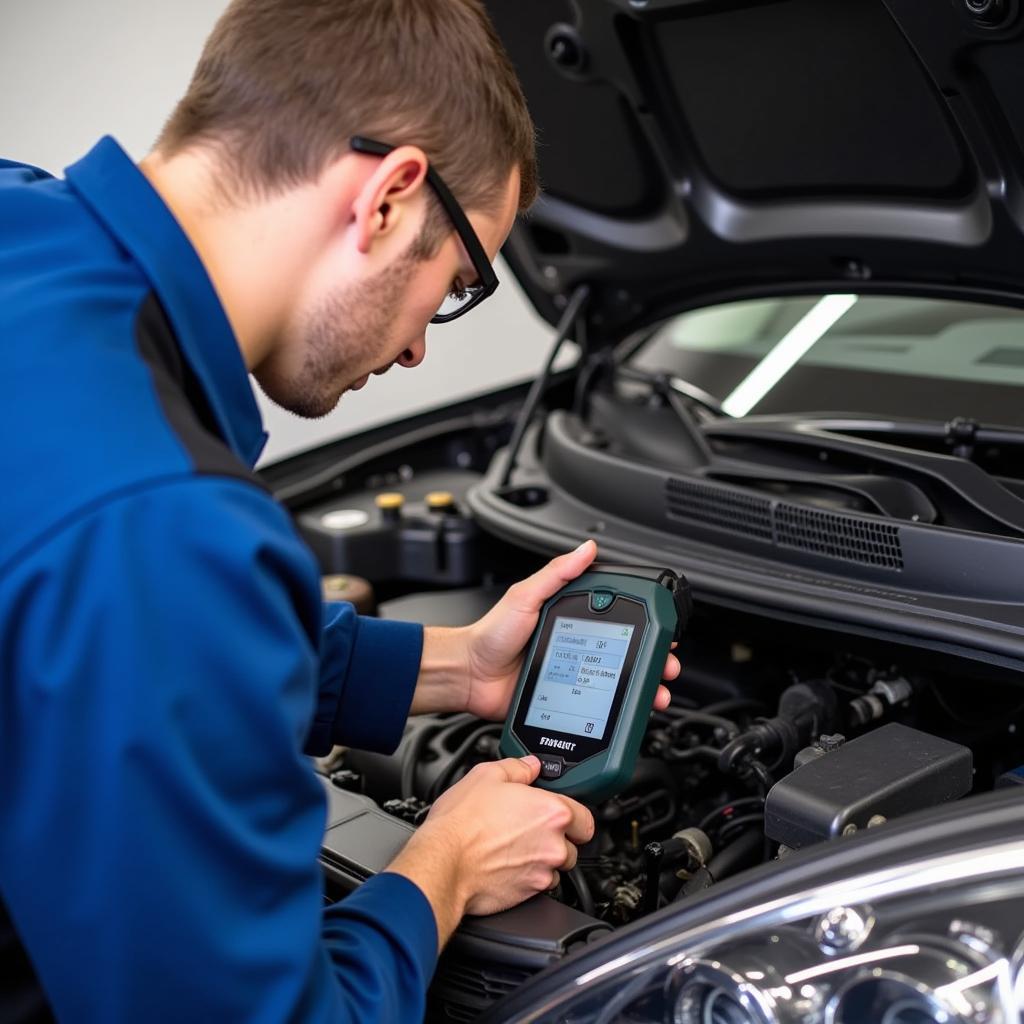Getting hit with an unexpected car repair bill is never fun, especially when it involves confusing diagnostic charges. “What did they even do for that price?” you might wonder. It’s a common feeling, and unfortunately, some less-than-scrupulous mechanics take advantage of this. However, understanding what a car diagnostic actually entails can help you avoid getting ripped off and feel confident about the service you receive.
What Does a Car Diagnostic Involve?
Contrary to popular belief, a car diagnostic isn’t just plugging your car into a computer and getting an instant answer. It’s a multi-faceted process that requires a skilled technician to interpret information from various sources. A proper diagnostic will typically involve:
- Interviewing You: This step might seem simple, but it’s crucial for the technician to understand the history of the issue. They’ll ask about specific symptoms, when they occur, and any past repairs that might be relevant.
- Visual Inspection: Before diving into the technical stuff, a technician will visually inspect your vehicle. They’re looking for obvious signs of damage, leaks, wear and tear, or anything else that looks out of place.
- Connecting to the OBD-II Scanner: This is probably the part you’re most familiar with. The On-Board Diagnostics (OBD-II) port allows the technician to access your car’s computer system and read stored error codes.
- Decoding the Error Codes: The OBD-II scanner doesn’t provide simple answers. Error codes are like cryptic messages that the technician needs to decode using their knowledge and experience. A single code could have multiple potential causes.
- Performing Physical Tests: Based on the error codes and their initial findings, the technician will perform targeted tests. This could involve checking fluid levels, testing battery voltage, inspecting specific components, or even road testing the vehicle.
- Analyzing the Data and Diagnosing the Problem: The final step is where the technician’s expertise shines. They’ll piece together all the information gathered to pinpoint the root cause of your car troubles.
 Mechanic connecting OBD-II scanner to car
Mechanic connecting OBD-II scanner to car
How Much Should a Car Diagnostic Cost?
The cost of a car diagnostic can vary significantly depending on several factors:
- Location: As with most services, location plays a role. Shops in busy urban areas or upscale neighborhoods might charge more than those in rural locations.
- Make and Model: Diagnosing a complex luxury vehicle with advanced technology will likely cost more than diagnosing a basic economy car.
- Complexity of the Issue: If your problem is straightforward and easily diagnosed, you’ll pay less than if the technician needs to spend hours tracking down an intermittent electrical gremlin.
- Shop’s Labor Rate: Each shop sets its own hourly labor rate, which factors into the overall diagnostic cost.
On average, you can expect to pay anywhere from $50 to $200 for a car diagnostic. Some dealerships or specialized shops might charge even more, especially for complex electrical or computer-related issues.
How to Avoid Getting Ripped Off
While most mechanics are honest and trustworthy, there are always a few bad apples. Here are some tips to avoid getting overcharged:
- Ask for a Detailed Estimate Upfront: Before authorizing any work, ask the shop for a written estimate that clearly outlines the cost of the diagnostic and any potential repairs.
- Inquire About Diagnostic Fees: Some shops might waive the diagnostic fee if you agree to have the repairs done there. It’s always worth asking.
- Get a Second Opinion: If a quote seems unusually high or you’re unsure about the diagnosis, don’t hesitate to get a second opinion from another reputable shop.
- Look for ASE Certified Technicians: Mechanics certified by the National Institute for Automotive Service Excellence (ASE) have demonstrated their competency and commitment to quality service.
- Read Online Reviews: Websites and apps like Yelp, Google Reviews, and Angie’s List can provide valuable insights into other customers’ experiences with a particular shop.
Don’t Skip the Diagnostic!
While it might seem tempting to skip the diagnostic and jump straight into guessing at repairs (or worse, ignoring the problem), this can cost you more in the long run. A proper diagnostic is an investment that can save you from unnecessary repairs and prevent small issues from snowballing into major (and expensive) problems down the road.
Be Informed, Be Empowered
Knowing what to expect from a car diagnostic and understanding the factors that influence its cost puts you in the driver’s seat. By being proactive and asking the right questions, you can ensure that you’re getting a fair price for a valuable service and keep your car running smoothly without breaking the bank.

Leave a Reply